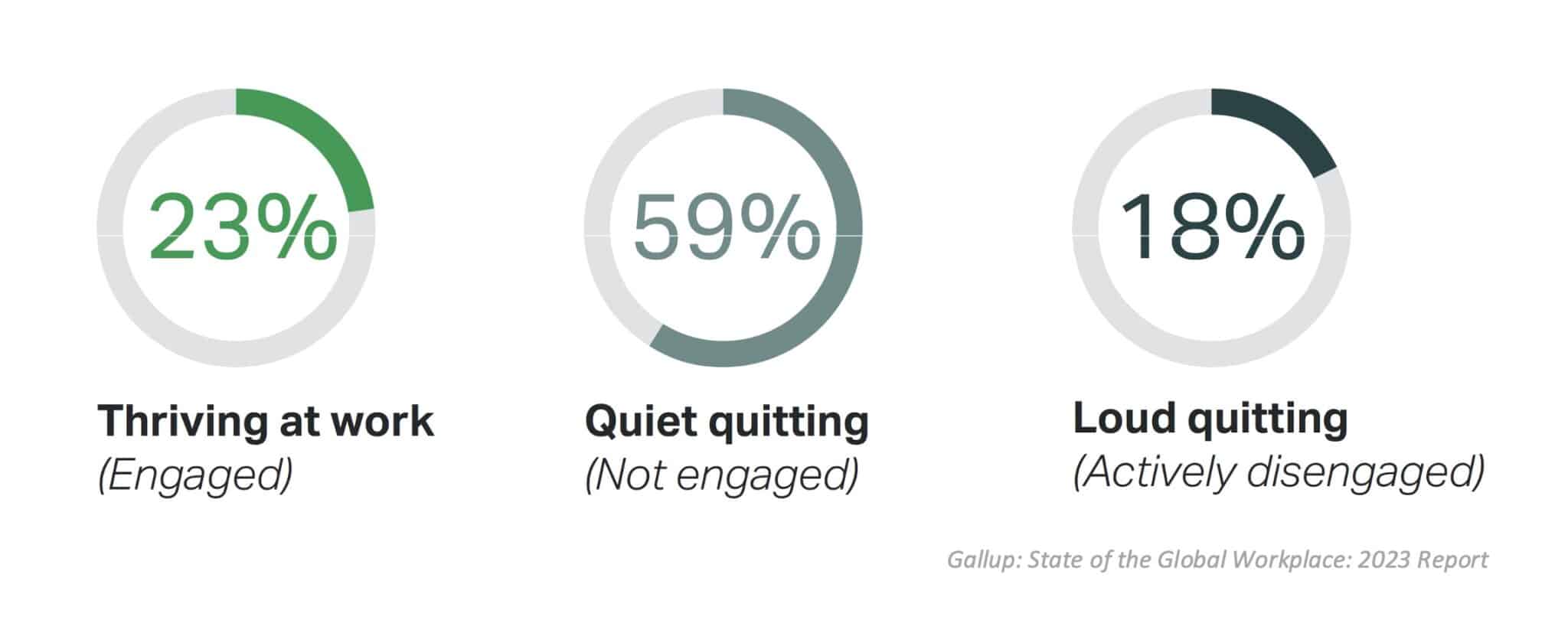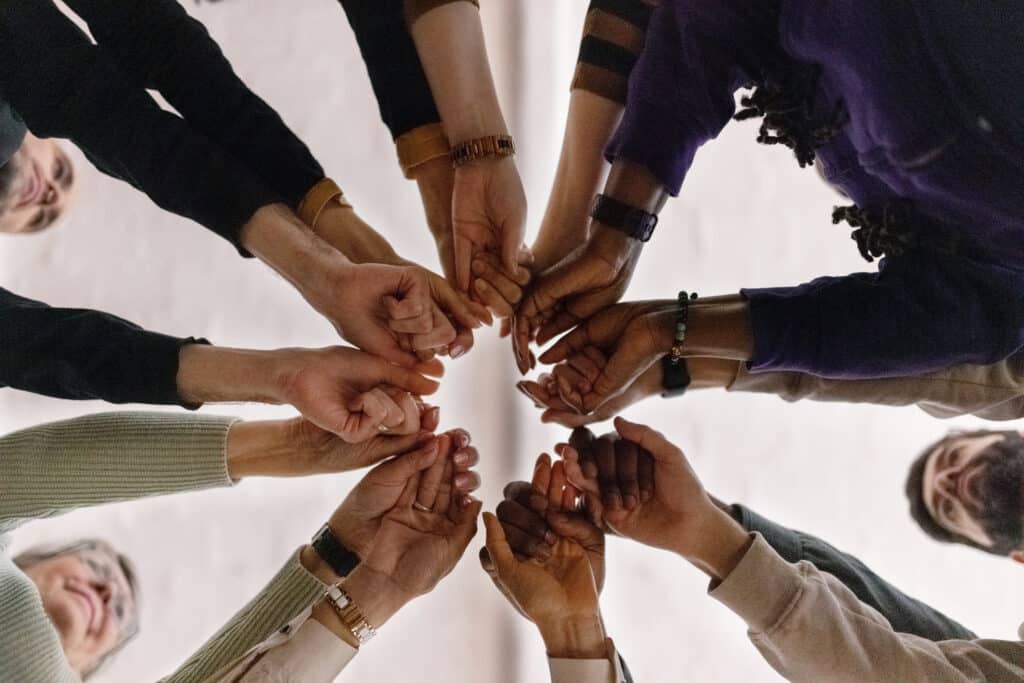The single biggest challenge to organisations in the 2020s is disengagement. Fatigue and low morale lead to quiet-quitting and minimal Mondays. Only by adopting a sustainable way of working can organisations develop the resilience they need to ride the 2020s rollercoaster.
As well as disengagement, organisations are also struggling with intergenerational communication, and persistent concerns about AI.
Leaders aren’t sure how to respond to this complex cocktail of challenges. Seeking help, many organisations try resilience training. But this is often muddied by a reluctance to recognise the stresses that led to the need for help in the first place, such as asking people to ‘do more with less.’
Organisations sometimes offer wellbeing initiatives such as apps, yoga, and subsidised gym memberships. These are ‘nice-to-have’ benefits, but they are not targeted solutions. They are often offered by well-meaning HR departments who’ve not had the chance to diagnose the deeper causes of disengagement.
Better than resilience training and apps, sustainable work practices offer a healthier alternative supporting long-term, viable productivity.
What is a sustainable way of working?
In a sustainable way of working, an atmosphere of shared respect, trust, and belonging encourages employees to commit to their full potential. This revitalises motivation, which leads people to do their best work, consistently, successfully, and sustainably.
A sustainable way of working presents an effective solution to the widespread difficulties currently experienced by multinationals around the world. From poor motivation to low productivity and retention problems, organisations are struggling to maintain morale. These issues are interconnected, hard to define, and difficult to tackle.
What’s the impact of disengagement?
According to 2023 research by Gallup, more than three-quarters of the global workforce are not engaged at work. Gallup found that 18% of employees are actively disengaged, while a further 59% are “quiet-quitting.”

Low morale leads to fatigue and burnout, disrupting productivity and damaging mental health:
- Gallup’s research found that in 2022 disengagement cost the global economy $8.8 trillion.
- In 2020-21, poor mental health cost UK employers £56 billion.
Wellbeing initiatives are not always targeted at the problems that undermine wellbeing in the first place. Organisations are responsible for workplace practices. However responsibility is easily offloaded. Individuals are left to manage workplace difficulties alone, whether they use the wellbeing initiatives or not. And most don’t.
While, on average, large organisations in the US spend about $10.5 million per year on wellbeing opportunities, only a handful of keen individuals take advantage of them. As few as 20% of US workers actually use their employers’ wellness programme. As of October 2022, a third of UK adults were offered neither physical nor emotional wellbeing support at work at all.
What are the causes of disengagement?
For three years, Working Voices has been analysing the causes of this level of disengagement, as the first step towards seeking an effective solution. We found two underlying factors:
- Fatigue has been a feature of work since at least the 2007 global financial crisis when many businesses began asking people to do more with less. Overbearing and unsustainable work practices are a breeding ground for lack of recognition, low trust, and high disregard for marginalised voices. A lack of respect at work encourages an atmosphere of mistrust, with a corresponding impact on morale.
- Also in 2007, smartphones were becoming ubiquitous, bringing with them social media and new ways of communicating. Short, sharp messaging pushed meaningful in-person interaction to the margins. So did the virtual calls that came later. Turns out social media isn’t very social. Communicating through a screen, living life through tech, is disconnecting.
In these circumstances, people feel alienated from fulfilment at work and disconnected from each other. Ultimately, these feelings lead to quiet-quitting, loneliness, disengagement, burnout, and resignations.
A decade after the financial crisis, the World Health Organization published its first detailed definition of burnout, describing it as “A syndrome conceptualized as resulting from chronic workplace stress that has not been successfully managed.”

What is an effective solution to disengagement?
While Gallup discovered that nearly six in 10 employees are quietly quitting, many respondents said they were likely to become engaged with a few changes to their workplace:
- Culture: 41%
- Pay and benefits: 28%
- Wellbeing: 16%
Given that 57% of employees favour changes to culture and/or wellbeing, this is the best place to start in tackling disengagement. Shifts in culture touch everyone, rather than a few enthusiastic individuals.
How then can leaders create a culture that includes and protects a sustainable way of working?
How to build a culture of sustainable working
As part of our research over the past three years, we’ve been focusing on the secrets of effective teamwork. Assessing work by academics, businesses, and psychologists, we found a consistent pattern of conclusions. We also noticed that their similarities are often overlooked.
These papers include:
1. The need to belong
In 1995, social psychologists Roy Baumeister and Mark Leary published their seminal paper, The Need to Belong: Desire for Interpersonal Attachments as a Fundamental Human Motivation. Showing that the desire to belong is a deeply rooted human motivation, this work has since been supported by research at MIT that suggests isolation provokes craving responses that mimic hunger. In other words, the urge to associate with other people is powerful and correlates with basic survival needs.
2. Psychological safety
In 1999, Amy Edmondson, a management professor at Harvard Business School, defined psychological safety as “shared belief held by members of a team that the team is safe for interpersonal risk-taking.” Edmondson refers to a climate of “interpersonal trust and mutual respect in which people are comfortable being themselves.” Psychological safety rejects negative behaviour, such as humiliation, that makes it hard for someone to feel they belong in the room.
3. Collective intelligence
In 2010, organisational psychologist Anita Woolley and others showed that a group’s “collective intelligence” was higher in teams who understood each other. Woolley’s findings suggest that teams work best when their members regard each other with empathy and understanding. In this environment, people give each other space – reading between the lines, and perceiving unspoken fears, concerns, ideas and solutions.
4. Project Aristotle
In 2012, Google’s Project Aristotle aimed to discover how to put an effective team together. Academic studies pointed to behavioural standards and team culture that govern how people function when working together. Drawing on the work of Anita Woolley, Project Aristotle researchers found that what mattered most was how teammates treated each other. Psychological safety went from being an uncertain phrase to becoming Google’s missing piece of the puzzle.
5. The role of oxytocin
In 2001, neuro-economist Dr Paul Zak developed a mathematical relationship showing the connection between trust in the workplace and economic performance. Zak’s research led him to the neurotransmitter oxytocin – a chemical involved with the exchange of information between brain cells. According to Zak, people at high-trust companies report:
- 74% less stress compared with people at low-trust companies
- 106% more energy at work
- 50% higher productivity
- 13% fewer sick days
- 76% more engagement
- 29% more satisfaction
- 40% less burnout
A concept of social wellbeing
These papers, and others, suggest that people work best when they feel they belong, they’re trusted, they are psychologically safe, and they can offer creative risk-taking ideas in an atmosphere free of blame or shame. Teams whose members trust each other develop greater collective intelligence than those who don’t.
Recognising the similarities in these papers, we brought them together in a new approach to wellbeing that can be rolled into company culture, supporting everyone from the boardroom to the interns. We call it social wellbeing.
Building on this evidence, we developed a package of future skills, which together support a culture of social wellbeing. They promote the sustainable working practices that lead to stronger morale, better productivity and higher retention.

Future skills for teams and organisations
We have grouped our future skills into five themes, each offering a selection of courses. These were designed with leaders in mind though many have already been adapted for employees. Clients can choose all the courses from one theme, or mix and match courses according to their needs.
1. Leading Through Change
The turbulent 2020s will continue to bring the change and complexity that have been heaped on us already. Complexity involves managing extensive detail. Uncertainty – involving a conspicuous lack of information – can be no less bewildering. It’s important to know both the nature of the challenge at hand, and how to soften the emotion that often accompanies it and that obscures a rational response. Courses within this theme include:
- Leading Through Change
- Leading Through Complexity
- Managing Uncertainty
- Leading With Bounded Optimism
- The Inclusive Leader – Parts 1 and 2
2. Agile Thinking
The greatest, most creative moments of human ingenuity have depended on agile thinking. Without it, flashes of inspiration wither away untouched.
An agile approach to thinking helps us question the first opinion we land on. We can assess its value, with the eye of a critic and decide whether to accept or reject it. This line of thought is often described as critical thinking though at Working Voices we refer to it as agile thinking. It’s an essential tool for anyone who needs to find solutions to complex questions. An agile way of thinking leads to informed opinions, good decisions, and effective actions. Courses within this theme include:
- Creative Thinking
- Scientific Thinking
- Collaborative Thinking
- Flexible Thinking
- How to Create a Growth Mindset
3. Working With AI
AI promises to bring as many opportunities to the workplace as it does concerns. While new developments will demand new skills, these will require more than just familiarity with functionality.
It’s not tech skills that we’ll need to focus on, it’s human capabilities such as being able to identify relevant information and communicate it effectively. These courses will help your organisation discover that the secret to working with AI lies in reimagining what your people are capable of – in other words, using new tech to its full potential through skills as old as humanity. Courses within this theme include:
- Thinking With AI
- Communicating Through AI
- Managing Others, With AI
- Using AI In Leadership
4. Communicating With Data
The interpretation of data, no longer confined to analysts, is fast becoming a regular part of jobs across an organisation. Assembling data into manageable chunks of information is only the start of the storytelling process. Analysis mostly depends on the ability of people to accurately interpret information, shape it into a narrative, and explain it to others. This work may start with specialist software, but only people can bring data to life for a range of audiences. Courses within this theme include:
- Data Confidence
- Storytelling With Data
- Data-led Consultancy Parts 1 & 2
5. Social Wellbeing
The quickest route to change, social wellbeing is the collective name for workplace behaviours that encourage trust, respect, belonging, and psychological safety. A culture focusing on these objectives revitalises motivation, leading to stronger engagement and better retention. Social wellbeing offers an alternative to traditional forms of wellbeing that sometimes depend on the whim of individuals. And because it affects everyone, from the boardroom to the interns, it underpins all our five themes. Our social wellbeing courses include:
- How Leaders Create Culture
- How to Create Psychological Safety
- Hybrid Working Practices
- The Social Human At Work
- Building Social Confidence
Sustaining growth in the turbulent 2020s
Creating a culture of sustainable practices isn’t easy. It can’t be out-sourced to an app or conjured up in an afternoon of resilience training. A desire for change must be demonstrated by leaders, rolled out to managers, and encouraged across the organisation. Success is well rewarded.
Analysis of employee engagement found that teams scoring in the top quartile on employee engagement were more productive and profitable, and benefitted from better retention:
- 10% higher customer loyalty/engagement
- 23% higher profitability
- 18% higher productivity (sales)
- 14% higher productivity (production records and evaluations)
- 18% lower turnover for high-turnover organisations
- 43% lower turnover for low-turnover organisations
Ultimately, we’re social animals. Without the fangs and claws to go it alone, humans are tribal. We depend on each other, we always have done. This drove our ancient need for belonging that lives on even in the 21st century. It’s why we run into trouble whenever belonging is hard to find.
Social wellbeing builds the trust and respect that helps us feel we belong, and that we’re a valued member of the team. These are the sustainable factors that keep us motivated from one day to the next. They are an essential part of what makes us human.

Insights into the Sustainable Human
Click here to download our PDF introducing the Sustainable Human
Related tips, advice and analysis from our Insights pages:
Managing the effects of stress at work
Your complete guide to Future Skills
Creative thinking helps blue-sky ideas keep their feet on the ground
How to use scientific thinking to demystify complexity
How collaborative thinking can help you get the best from your team
How to develop flexible thinking using mental models
The benefits of e-learning in tackling AI concerns
Your complete guide to hybrid working





